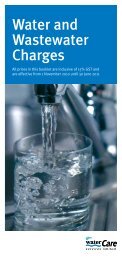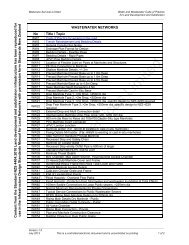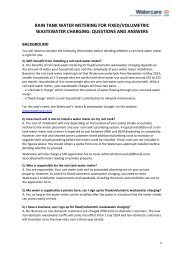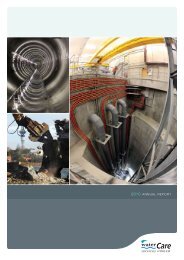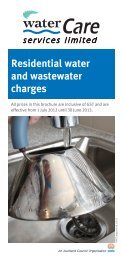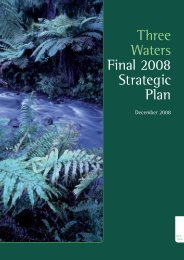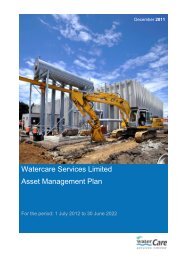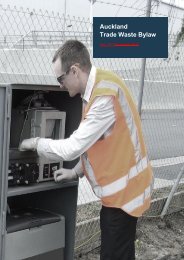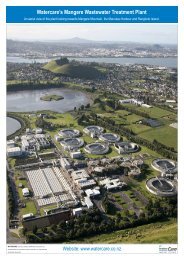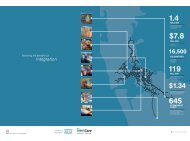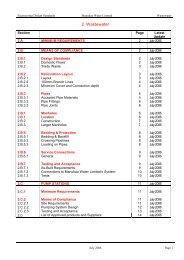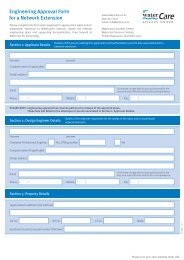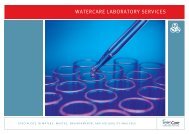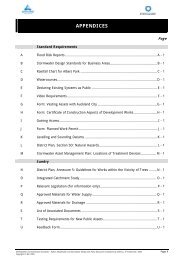Annual Report 2011 - Watercare
Annual Report 2011 - Watercare
Annual Report 2011 - Watercare
Create successful ePaper yourself
Turn your PDF publications into a flip-book with our unique Google optimized e-Paper software.
<strong>Watercare</strong> Services Limited<br />
<strong>2011</strong> ANNUAL REPORT<br />
<strong>2011</strong> STATEMENT OF SERVICE PERFORMANCE (continued)<br />
(b) To provide for the safe transportation, treatment and disposal of bulk wastewater.<br />
(i) To target no more than 15 dry-weather sewer overflows per 100km of wastewater pipe length per annum.<br />
There were 1.9 recorded dry weather sewer overflows per 100km of wastewater pipe length. Dry weather overflows exclude overflows<br />
caused by stormwater entering the network, and are normally caused by chokes or breaks in the system.<br />
(c) To be responsive to customer needs and to deliver a service meeting contractual standards.<br />
(i) To achieve 100% compliance with the customer contracts.<br />
This measure refers to the contracts with the six local network operators (LNOs) prior to integration. Full compliance was met with the LNO<br />
contracts. The United Water contract for the Papakura area is the only contract to carry on beyond integration and this continues to be<br />
complied with.<br />
Asset management<br />
(a) To develop and implement effective and efficient capital investment and maintenance programmes.<br />
(i) To ensure that capital projects have robust business cases and are delivered to plan.<br />
All <strong>Watercare</strong> capital projects are supported by robust business cases and are managed to ensure delivery to plan in a timely and costeffective<br />
manner. Project progress is reported regularly to the executive and the board. Upon project completion, post-completion reports are<br />
compiled for all projects and are reviewed to identify opportunities for improvement. Since April <strong>2011</strong>, projects over $10 million are reviewed<br />
by the board.<br />
(ii) To continue with the implementation of the reliability centred maintenance (RCM) system on strategic assets.<br />
An RCM-based maintenance programme has been implemented for the Mangere Wastewater Treatment Plant, for the water and wastewater<br />
networks and for water treatment and head works assets. RCM models will be updated as needed. RCM has been used to assist with the<br />
development of the maintenance budgets.<br />
(b) To maintain a focus on integrated planning with customers to secure long-term wastewater solutions and manage regional<br />
wet weather overflows.<br />
(i) To facilitate a process to agree regional environmental objectives, including the setting of wastewater overflow performance targets for<br />
each of the region’s key receiving water environments, within three years.<br />
<strong>Watercare</strong> is continuing to work with the Auckland Council’s planning and stormwater teams to progress these issues. With the replacement<br />
of the LNOs, <strong>Watercare</strong> now deals directly with Auckland Council on the setting of targets and these are formally adopted through the SCI/SOI<br />
process. Progress on the SCI/SOI performance targets are reported to the Council quarterly. The process of developing the 2012-2014 SOI is<br />
due to begin in October <strong>2011</strong><br />
(ii) To progress planning associated with the Central Interceptor.<br />
<strong>Watercare</strong> has presented to the Auckland Council Accountability and Performance Committee and to cluster groups of the local boards<br />
on wastewater issues including the Central Interceptor. Planning for the Central Interceptor project continues and a project manager for<br />
<strong>Watercare</strong> has been appointed. The focus on preparing material for the consenting phase continues.<br />
Economic performance<br />
(a) To ensure that financial strategies are consistent with achieving economic efficiency, intergenerational equity and an<br />
optimal cost of capital.<br />
(i) To meet the requirements of the Auckland City Council guarantee of <strong>Watercare</strong>’s debt.<br />
All requirements of the guarantee were met.<br />
(ii) To achieve a minimum funds flow from operations (FFO) to interest cover of 2.5 times before any price adjustments.<br />
<strong>Watercare</strong> exceeded this target. The FFO ratio at 30 June <strong>2011</strong> was 3.32. The higher-than-target ratio resulted from a combination of<br />
higher-than-budgeted funds from operations, due largely to lower operating costs, and a lower-than-budgeted gross interest expense<br />
caused by lower borrowings and a lower cost of funds. Funds from operations as the numerator in the ratio is Net Profit after<br />
Tax + Deferred Tax + Loss on disposal and provision for redundant property, plant and equipment and other restructuring<br />
costs + Depreciation + Interest Expensed in the Statement of Performance – Interest Income. Interest in the denominator is<br />
Gross Interest (i.e. includes capitalised interest) – Interest Income.<br />
PAGE 109<br />
<strong>2011</strong> Financial <strong>Report</strong><br />
Return to Contents page




